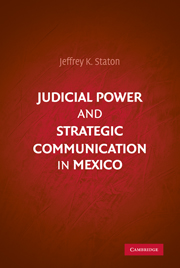Book contents
- Frontmatter
- Contents
- List of Tables
- List of Figures
- Acknowledgments
- PART I JUDICIAL COMMUNICATION AND JUDICIAL POWER
- PART II THE POLITICS OF CONSTITUTIONAL REVIEW IN MEXICO
- 3 Public Relations on the Mexican Supreme Court
- 4 Decisions, Case Promotion, and Compliance
- PART III RELATIONSHIPS BETWEEN TRANSPARENCY AND LEGITIMACY
- References
- Index
4 - Decisions, Case Promotion, and Compliance
from PART II - THE POLITICS OF CONSTITUTIONAL REVIEW IN MEXICO
Published online by Cambridge University Press: 06 July 2010
- Frontmatter
- Contents
- List of Tables
- List of Figures
- Acknowledgments
- PART I JUDICIAL COMMUNICATION AND JUDICIAL POWER
- PART II THE POLITICS OF CONSTITUTIONAL REVIEW IN MEXICO
- 3 Public Relations on the Mexican Supreme Court
- 4 Decisions, Case Promotion, and Compliance
- PART III RELATIONSHIPS BETWEEN TRANSPARENCY AND LEGITIMACY
- References
- Index
Summary
The conflict between Ernesto Zedillo and the Chamber of Deputies, which the Supreme Court resolved and publicly promoted in the summer of 2000, concerned one of the most politically controversial policies of the time. To save a collapsing financial sector during the 1994 peso crisis, the federal government had assumed the debts of several failing banks under the Banking Fund for Savings Protection (FOBAPROA), a program originally designed to ensure depositor assets. By 1998, it had become clear that many of these obligations were unrecoverable, and Zedillo proposed transferring them to the general public account, this time to ensure the solvency of FOBAPROA itself. Opposition parties in the Chamber of Deputies viewed the proposal skeptically, largely because a number of the loans in question were granted under lax risk management standards and, in some cases, were simply illegal, made by bank managers to family members, friends, and in some cases, to themselves. In addition, the president of the bankrupt Banco Unión, Carlos Cabal Peniche, announced in a Miami Herald interview that he illegally channeled U.S. $25 million to 1994 PRI electoral campaigns via a trust account that was assumed by FOBAPROA. The trust had been established by Fernando Ortiz Arana y Carlos Enrique Sales Gutiérrez, then the president and finance secretary of the PRI; and, it had been funded by loans from Banco Unión to companies associated with Cabal Peniche himself.
- Type
- Chapter
- Information
- Judicial Power and Strategic Communication in Mexico , pp. 65 - 122Publisher: Cambridge University PressPrint publication year: 2010



